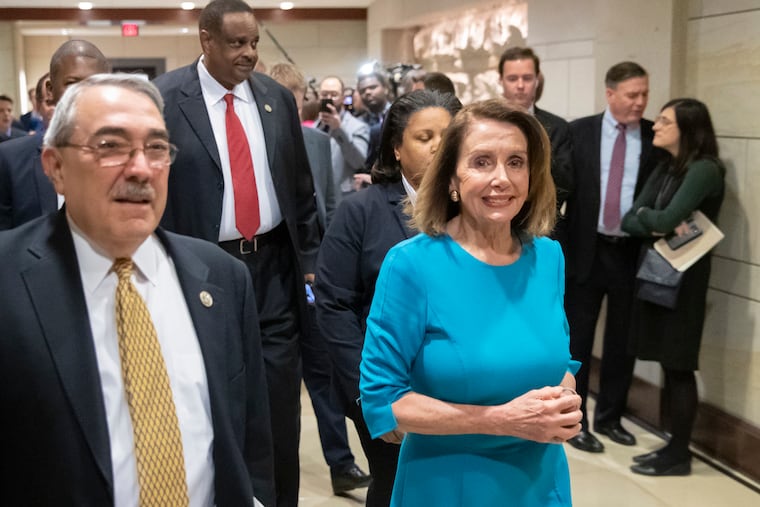Democrats nominate Rep. Nancy Pelosi for House speaker
Dems' show of strength that will be tested when the full House votes in January.

WASHINGTON - House Democrats, poised to take control of the chamber next year, met behind closed doors on Wednesday to nominate a speaker and choose other members of their leadership team.
House Minority Leader Nancy Pelosi of California won her unopposed bid to be leader of the Democratic caucus. But her bid to become speaker again faces opposition.
The full House, including Republican members, will choose a speaker on Jan. 3. If Democrats win two uncalled races where their candidates are leading, they will have won 235 seats, meaning Pelosi can weather as many as 17 defections.
Pelosi took the first step to reclaiming the speaker's gavel as she secured a majority of votes in Wednesday's closed-door session. Opponents offered no alternative candidate.
When the new Congress meets Jan. 3, Pelosi must overcome more than a dozen Democratic rebels to amass the necessary votes in the full House to become speaker.
Earlier, Pelosi addressed reporters on Capitol Hill as votes were being counted in the race for Democratic leader. She said it was "so inspiring" to hear her colleagues place her name in nomination for speaker and dismissed questions about dissenters within her caucus.
"Our diversity is our strength, but our unity is our power, and we will use that power again in a unifying way for our country," she said, maintaining that "we're in pretty good shape" for January's speaker vote.
She concluded her remarks by reminding those present that Democrats will soon be back in the "majority, majority, majority!"
Also Wednesday, California Rep. Karen Bass has been elected chair of the Congressional Black Caucus, as the group is poised to flex its political muscle like never before.
Bass, the first African-American woman to become the speaker of any state legislature, has served in Congress since 2010. Some had touted her as a potential successor to Pelosi, but Bass announced earlier this month that she was supporting Pelosi and focusing on her CBC bid instead.
In the next Congress, the CBC will have more than 50 members for the first time since its founding in 1971, accounting for more than 20 percent of all Democratic votes. CBC members will chair five House committees and 28 subcommittees, according to the group.
In their first leadership vote on Wednesday, House Democrats selected New York's Hakeem Jeffries over California's Barbara Lee for caucus chair, the No. 5 position.
The two lawmakers, both of whom are members of the Congressional Black Caucus, were running to replace Rep. Joseph Crowley of New York, who was ousted in a primary in the summer.
Jeffries prevailed 123-113.
The race featured candidates from different generations. Jeffries is 48, while Lee is 72.
"We had two outstanding people run to be caucus chair, and it was a very close vote, and I think Hakeem will rise to the challenge," Rep. Cheri Bustos of Illinois said. "You want to discuss the new generation leadership - Hakeem is certainly toward the top of that list."
Rep. G.K. Butterfield of North Carolina said he backed Lee because "she has the institutional knowledge and the ability to bring all the different caucuses in harmony."
- - -
The Washington Post’s Elise Viebeck, Paul Kane and JM Rieger contributed to this report.